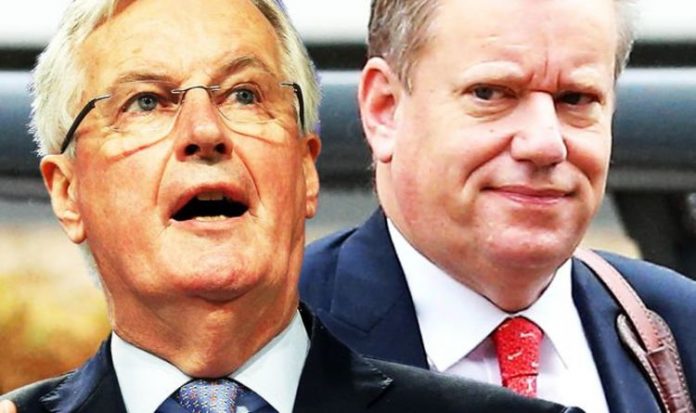On Monday, the House of Commons voted on a controversial new bill published by the Government. The UK is currently in a transition period that keeps it bound to the EU’s rules until December 31. The two sides are trying to negotiate a new trade deal that would come into effect once this period ends, but talks have been characterised by perpetual deadlock.
Sticking points in the talks include the rights of European fleets in British waters and the so-called level playing field.
With the new Internal Market Bill, the Government is essentially seeking to prevent disruption to trade between the four nations of the UK if no deal is reached with the EU.
Downing Street has described it as a “vital legal safety net”.
However, the move has enraged the EU and prompted a fresh rebellion within the Conservative Party.
Brussels has set Prime Minister Boris Johnson a three-week deadline to ditch his plans or face financial and trade sanctions, with the clear suggestion that negotiations over a future relationship will fail unless the most contentious parts of the proposed legislation are removed.
As tensions are set to rise in the incoming days, former Europe Minister Denis MacShane revealed in a recent report for the London School of Economics (LSE)’s blog, how the Brexit negotiations could end “without war being declared”.
Mr MacShane, who served under former Prime Minister Tony Blair, wrote: “No 10 has made a great deal of fuss about the need for the UK to be allowed to increase state aid outside EU norms.
“Clearly no country can easily accept open trade with a neighbour who massively subsidises its firms to trade at low prices and dump goods or service on the markets of its neighbours.
JUST IN: Major and Blair’s ‘absurd double act’ to stop Brexit laid bare
“But EU state aid is very flexible. At the moment the UK is in the lowest quartile for state financing of economic actors. It would increase state aid four-fold to £61billion about twice the size of the defence budget and still be within EU rules.
“EU rules do not prevent member state governments from focusing aid on their own legitimate policy objectives including regional development which could help the so-called ‘red wall’ seats in de-industrialised regions of the north and Midlands.
“As it is, the EU has increased state aid to €2.9trillion (£2.6trillion) to be spent on 288 programmes in response to the COVID pandemic’s hit on the economy. It is surely possible for Barnier and Frost to find words that allow the UK far more leeway in increasing state aid in response to COVID to meet Johnson’s and Tory MPs’ demands and he can then proclaim this as a victory for his tough line and bring back a bit of paper to declare he has won the Battle of Brexit with Europe.”
The same is true for fishing, Mr MacShane added.
A crude extension of UK territorial waters to 200 nautical miles around the UK coast won’t work, Mr MacShane noted, as most British fishing boats are owned by foreign firms and 30 percent of on-board fishing workers are EU citizens.
He explained: “In any event 60 percent of all the UK catch is sold to Europe so there is little point in having a fishing war with the EU if UK based trawlers cannot sell their catch.
“For centuries British, French, Belgian, Dutch, Danish, German and Spanish fishing communities have co-existed even with some friction at the edges. The need to preserve fish stocks, which is what the EU Common Fisheries Policy now mainly does, iis important to British fishing communities and 12,000 men and women who work in fishing as any other country. Again, it should be possible to set up a new regime based on quotas and regular reviews that can satisfy most fishing communities.
DON’T MISS:
Trump’s ‘robust’ approach with China praised by Australian Senator [EXCLUSIVE]
Boris Johnson’s plan to override Brexit deal can lead to ‘ROYAL mess’ [ANALYSIS]
Brexit insight: Boris Johnson’s no deal pledge could damage Starmer [INSIGHT]
“If Barnier and Frost can agree this, Johnson can bring this home as a victory.”
Some in Brussels, Mr MacShane said, and many in the Tory Party, want a big bang Brexit but that is not in Mr Johnson’s political interests.
He concluded: “It will be awkward for the EU and new agreements may be needed to open the door to continuing discussions after January 2021.
“It is not in Europe’s interests to have a major crisis on its borders with Britain nor can Mr Johnson want endless TV reports of ‘Brovid’ economic dislocations as he faces the problem of Scottish secession, and a Labour Party back in business.
“It is the Brexit Johnson promised in 2016 – one that takes the UK out of the Treaty – but does not worsen the economic future of the UK or reduce the rights of British and EU citizens to live harmoniously.
“It is called a compromise which used to be a British, especially a Tory British, speciality.
“Might it happen?
“If it does it will be at the very last possible moment like everything Johnson does.”







